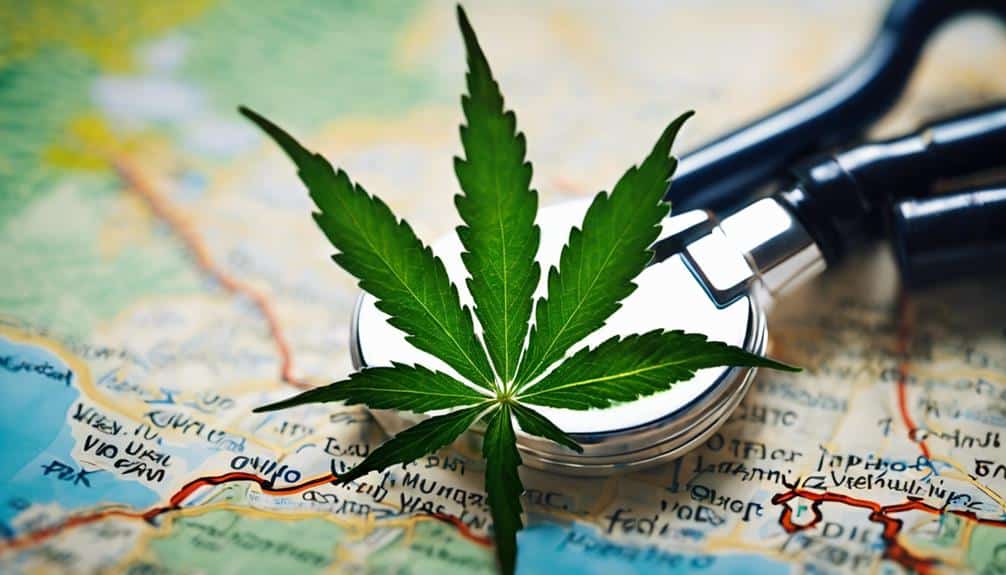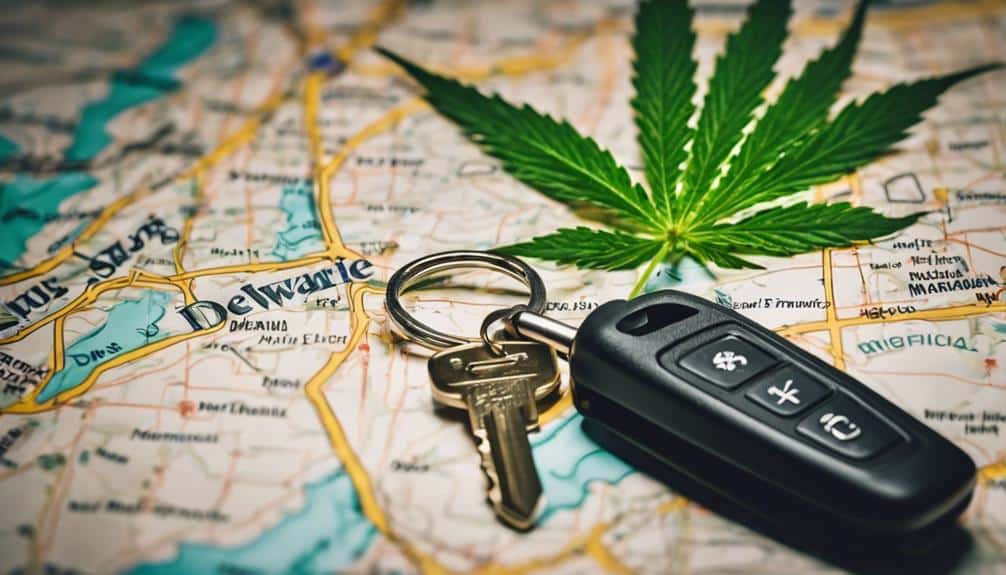You’re likely familiar with Delaware’s medical marijuana laws, which permit usage for certified patients. However, have you considered how these laws intersect with driving regulations? Even in medicinal doses, THC can impair driving, and the state doesn’t ignore this fact. The legal repercussions of driving under the influence of marijuana can be severe. So what measures should you take to ensure your compliance with the law while benefiting from your medication? Let’s delve deeper into this intriguing intersection of health and law.
Table of Contents
Delaware’s Medical Marijuana Laws

Considering Delaware’s medical marijuana laws, it’s important to understand that they permit qualified patients to use marijuana for medicinal purposes. This reflects a significant shift in the state’s approach to drug regulations. The ‘Patient Qualifications’ are stringent and aim to ensure only those requiring medical relief get access. You need to have a qualifying condition such as cancer or chronic pain and a written certification from a licensed physician. You’re also required to complete an application process with the Department of Health and Social Services (DHSS).
The ‘Dispensary Regulations’ in Delaware are designed to ensure safe and controlled access to medical marijuana as well. Dispensaries or compassion centers must meet strict operational standards including security measures, record-keeping, and product testing. They’re also required to be non-profit entities, with DHSS responsible for their licensing and oversight.
This approach combines rigorous patient qualifications with tight dispensary regulations, ensuring that medical marijuana usage in Delaware is carefully managed. It balances the need for patients to have access to therapeutic options with the necessity of limiting potential misuse. While not perfect, it attempts to serve the people of Delaware in their varied and complex health needs.
Medical Marijuana and Driving Impairment
While Delaware’s laws ensure controlled access to medical marijuana, it’s equally important for you to understand the potential risks associated with driving under its influence. The primary psychoactive compound in marijuana, THC, increases cannabinoid concentration in your system. This can significantly impair your motor coordination, reaction times, and decision-making abilities—posing a serious danger on the road.
Impairment testing is a key tool in assessing one’s ability to drive after consuming medical marijuana. It’s worth noting that impairment can manifest even with low levels of THC as individual tolerance varies greatly. The tests focus on psychomotor skills, divided attention tasks, and cognitive functioning—all critical for safe driving.
While medical marijuana can relieve certain health conditions, it’s crucial to balance its use with the responsibility of ensuring safety on the roads. It’s about making informed decisions—always gauge your level of impairment before getting behind the wheel. If you’re unsure, consider other transportation options. Remember: your health shouldn’t compromise your safety or others’ safety on the road.
Legal Consequences for Driving High

Despite any therapeutic benefits you might derive from medical marijuana, there’s a hefty legal price to pay if you’re caught driving high in Delaware. The state imposes severe penalties for individuals found guilty of this offense. You’re not just risking a fine—you could also face imprisonment, probation, or mandatory drug education programs.
Roadside testing is a common method used by law enforcement officers to determine if a driver is under the influence of marijuana. This could involve field sobriety tests as well as blood, urine, or saliva tests. Failing these tests or refusing to take them can lead to immediate arrest or license suspension.
Moreover, a conviction can have long-lasting implications beyond the immediate legal penalties. You could see increased insurance premiums, job loss, or difficulties in finding employment due to a criminal record.
In summary: while medical marijuana may offer relief for certain conditions, it’s important to understand that driving under its influence is a serious offense in Delaware. Always consider the potential legal consequences before getting behind the wheel—it’s not just about your own safety but also the wellbeing of others on the road.
Exceptions to the Rule
That said, there are certain situations where the strict rules against driving under the influence of medical marijuana in Delaware may not apply. These scenarios—often referred to as ‘Law Exceptions’—are indeed few but crucial for those relying on medical marijuana for therapeutic purposes.
One primary ‘Therapeutic Exception’ is if you have a medical marijuana card and are transporting the drug from a dispensary to your home. In this case, the law may be lenient provided you’re not consuming while driving. However, this isn’t carte blanche—you must still demonstrate that you’re fit enough to operate a vehicle safely.
Another ‘Law Exception’ is if your system contains marijuana due to legally prescribed medication. Some approved medications contain cannabinoids, the active components of marijuana. If you’re pulled over and tested, you must present a valid prescription to validate your exemption.
However, remember: these exceptions don’t absolve you from responsibility. The key is always to prioritize safety and the well-being of others on the road.
Tips for Safe and Legal Use

To ensure you’re using medical marijuana responsibly and lawfully while driving in Delaware, keep these indispensable tips in mind:
Firstly, be informed about your Patient Rights. As a registered patient, you’re entitled to use medical marijuana but not exempt from the law prohibiting impaired driving. The key is to use your medication in a way that doesn’t affect your ability to drive safely.
Secondly, focus on proper Cannabis Storage. Delaware law requires that medical marijuana be kept in a sealed container out of reach while driving—meaning it can’t be in your glove compartment or on the passenger seat—it should be stored in the trunk.
Lastly, always carry your medical marijuana registry identification card with you. This verifies your legal right to use medical marijuana—in case of a police stop it’ll help clarify your situation and protect your patient rights.
Conclusion
In Delaware, navigating between medical marijuana usage and safe driving isn’t straightforward—it’s like walking a tightrope balancing medicinal needs with road safety. Remember: even a hint of impairment can land you in hot water. Exceptions exist, but they’re rare. So stay sharp, follow the law to the letter, and keep your driving record clean. The bottom line? Don’t gamble with your safety or your rights.
I know it sounds like a lot to keep up with—feeling overwhelmed? Don’t worry—you’re not alone. We’re here to help you navigate these tricky waters. Why not take a moment to visit us at Cannabis Docs of Delaware? We have a wealth of information that can guide you on this journey—or if you prefer, give us a call at (855) 420-6797—we’re always ready to lend a helping hand. Remember: we’re in this together—so take that first step and reach out to us.

